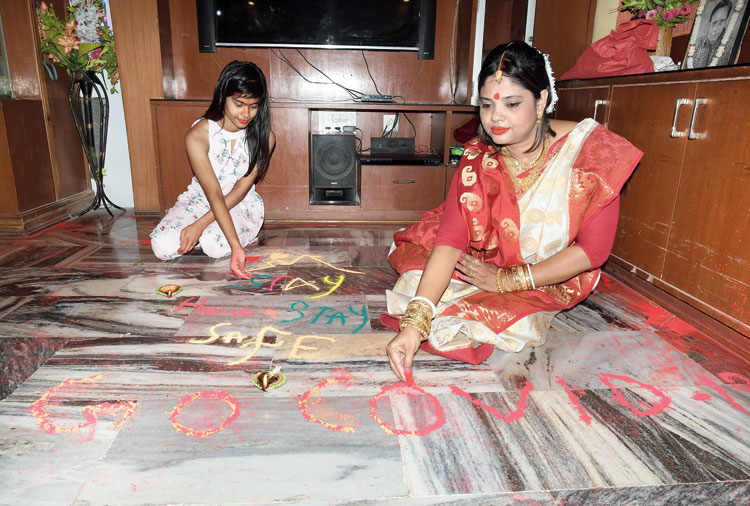Video calls instead of visiting each other’s homes. Cook-ins instead of a lavish restaurant buffet. Bengalis, Tamilians, Malayalis and the Assamese heralded a simple New Year on Tuesday.
In Ranchi, the familiar strains of the Rabindrasangeet Eso he Baisakh... was missing from the Union Club, a cultural landmark of the capital, for the first time in Poila Baishakh, the Bengali New Year, in decades.
“But it’s a small sacrifice if it helps check the spread (of coronavirus) and saves people,' said Subir Lahiri who is normally involved in organising such cultural events.
“Poila Baishakh addas can still happen in this age of virtual communication,” chipped in Sudipto Chakraborty, an architect who retired from service a few months ago. “I often chat with friends on video-conferencing platforms.”
Ranchi Bengalis missed their mishti, but some managed to get maach.
“I've sold about 40 kgs of rohu and katla,' said Anup Lohra, a fish vendor at Lalpur market, adding he and the buyers maintained social distancing.
There was no rush at the Church Road Kali Mandir in the morning and a few offered puja quietly.
The Bangali Yuva Manch collected money and distributed dry ration of rice, pulses etc to about a 100 needy families. “We thought of celebrating the day differently this year,” said outfit secretary Siddhartha Ghosh.
In Jamshedpur, homemaker Sumona Chatterjee said she missed offering the Poila Baisakh puja at the Beldih Kalibari for the first time in 30 years.
“This is the lockdown effect,” she said.
The times have changed completely in the space of a month, added Reshmi Chowdhury, a resident of Vijaya Heritage in Kadma. “There is no going out so we kept it simple with homemade kheer. In other years, we usually go in a large group to one of the food festivals at a hotel.”
However, many people are happy that the whole family is together to celebrate the special day as professionals are working from home, those studying outside are back, and children have no school.
People flouted social distancing to throng a couple of sweet shops in Parsudih.
The Tamil and Malayali communities also celebrated Puthandu and Vishu, respectively, with the utmost simplicity.
Priya Nagarajan, who works in the corporate sector, said she missed visiting the temple on Tamil New Year, and did not get the fruits and vegetables of her choice on this special day. “But we followed the ritual of keeping fruits, vegetables, paddy stalk, coin and jewellery in front of the mirror, which we believe brings prosperity,” Priya said.
Priya added that she believed in silver linings. “The lockdown ensured the whole family was together to celebrate the day. In other years, our children are at school and we are at work. This time we all stayed home together, and it was nice,” she said.











